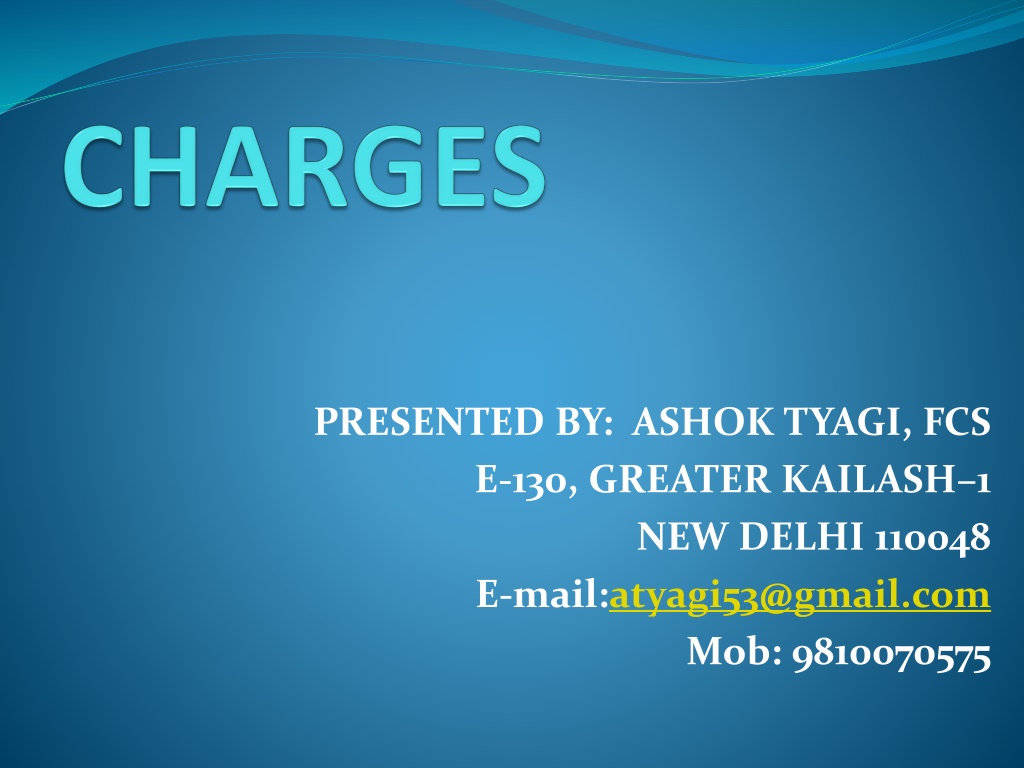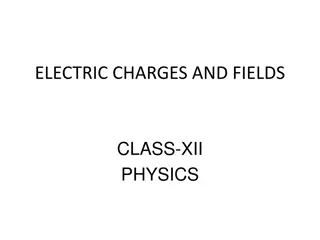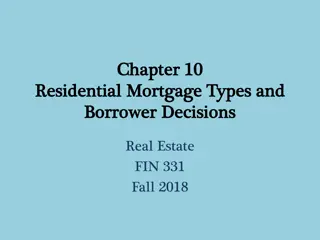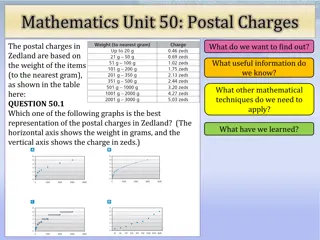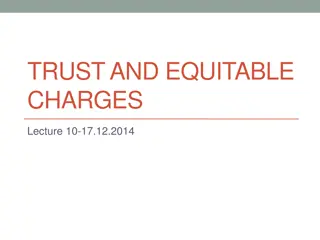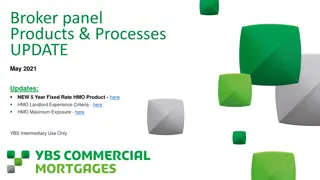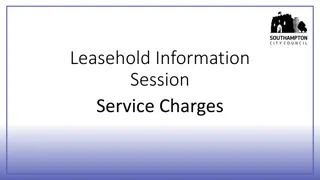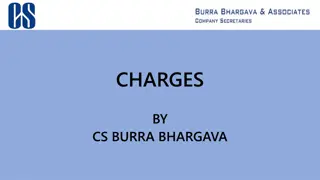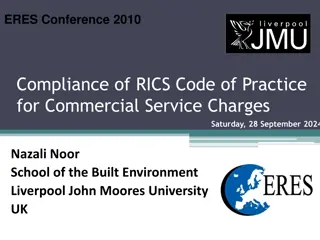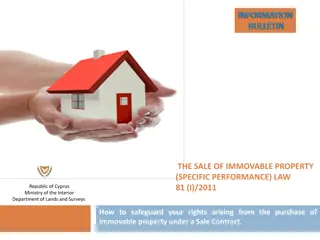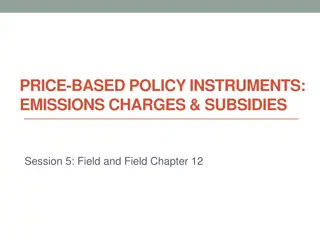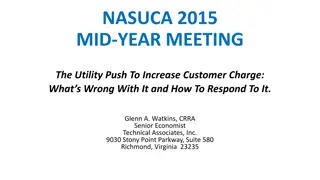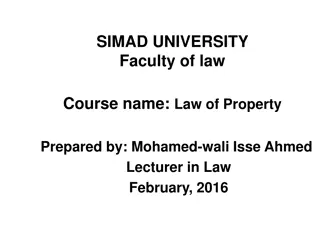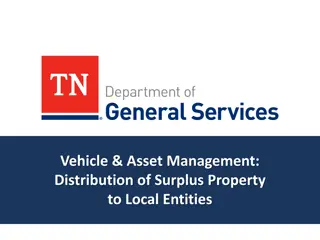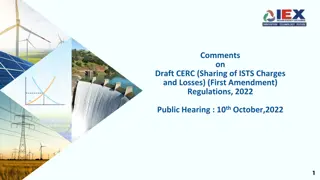Understanding Charges and Mortgages in Property Transactions
According to the Transfer of Property Act and Companies Act, charges and mortgages play significant roles in property transactions. This content explains the definitions of charges and mortgages, their distinctions, registration requirements, and the duty of companies to register charges. It covers key aspects such as creating security for loans, interests in property, registration procedures, and legal implications. Understanding these terms is essential for individuals and companies involved in property dealings to ensure compliance and protect their interests.
Download Presentation

Please find below an Image/Link to download the presentation.
The content on the website is provided AS IS for your information and personal use only. It may not be sold, licensed, or shared on other websites without obtaining consent from the author. Download presentation by click this link. If you encounter any issues during the download, it is possible that the publisher has removed the file from their server.
E N D
Presentation Transcript
PRESENTED BY: ASHOK TYAGI, FCS E-130, GREATER KAILASH 1 NEW DELHI 110048 E-mail:atyagi53@gmail.com Mob: 9810070575
WHAT IS A CHARGE AS PER TRANSFER OF PROPERTY ACT, 1882 According to Section 100 where immovable property of one person is, by act of parties or operation of law, made security for the payment of money to another, and the transaction does not amount to mortgage, is called charge. AS PER COMPANIES ACT, 2013 Section 2(16) of the Companies Act, 2013 defines charges so as to mean an interest or lien created on the property or assets of a company or any of its undertakings or both as security and includes a mortgage.
MORTGAGE Mortgage is the transfer of an interest in specific immovable property for the purpose of securing the payment of money advanced or to be advanced by way of Loan OR the performance of an engagement which may give rise to pecuniary liability An existing Debt Or future Debt
Distinction between Mortgage and Charge A mortgage is transfer of an interest in the property made by the mortgagor as a security for the loan, while the charge is not the transfer of any interest in the property through it is security for the payment of an amount. A charge may be created by act of parties or by operation of law. A mortgage can only be created by act of parties.
Distinction between Mortgage and Charge A mortgage deed must be registered and attested by two witness, while a charge need not be made in writing, and if reduced to writing, it need not be attested or registered.
Chapter VI The heading of the Chapter is: Registration of Charges under the Companies Act, 2013 It consists of Section 77 to 87 (11 sections) Section 86 (Punishment for contravention) has become effective from 12.09.2013
DUTY TO REGISTER CHARGE A Company creating a charge, shall, register the particulars of the said charge with the ROC within 30 days of its creation in Form CHG-1. This charge could be: a) on its property or assets or b) any of its undertakings c) whether tangible or otherwise Situated in or outside India Signed by both the Companies and the charge-holder Together with the instruments creating the charge
DUTY TO REGISTER CHARGE Creating or modifying the charge shall be filled in Form CHG-1 (for other than Debentures) or Form No. CHG-9 (for debentures including rectification) with the registrar. Where a charge is registered with the Registrar under sub-section (1) of section 77 or section 78, he shall issue a certificate of registration of such charge in Form No CHG-2. Where the particulars of modification of charge is registered under section 79, the Registrar shall issue a certificate of modification of charge in Form CHG-3.
Section 77(1)- 1st Proviso In the previous slide, we mentioned 30 days (Section 77(1)) ROC may on application in Form CHG-10 by the company, allow this registration within 300 days (30+270), on payment of additional fees This application shall be supported by a declaration from the company by its secretary or director that such not adversely affect rights of any other creditors of the company If not within 300 days, company to seek extension of time from the CG; applicable Section 87 in Form CHG-8
Condonation of delay for Registration of Charge Where the instrument creating or modifying a charge is not filed within a period of 300 Days from the date of its creation or modification the Registrar shall not register the same unless the delay is condoned by the Central Government. Where the instrument satisfaction of the charge is not filed within 30 Days from the date on which such payment of satisfaction, the Registrar shall not register the same unless the delay is condoned by the Central Government.
Condonation of delay for Registration of Charge The application for condonation of delay shall be filed with the Central Government in Form No.CHG-8 along with the fee. [ By Notification F. No. 1/6/2014- CL.V Dated: 21-5-2014 THIS POWER HAS BEEN DELEGATED TO REGIONAL DIRECTOR) The order passed by the Central Government under sub-section (1) of section 87 of the Act shall be required to be filed with the Registrar in Form No.INC.28.
Satisfaction of Charge A Company shall within a period of 30 days from the date of payment or satisfaction in full of any charge registered under Chapter VI, give intimation of the same to the Registrar in Form CHG-4. Registrar shall issue a certificate of registration of satisfaction of charge in Form CHG-5.
CHARGES FILING OF WHICH WITH ROC IS NOT NECESSARY Guarantee doesn t require Registration. Charge created by operation of law need not be filed. Negotiable Instrument (Hundi) is not a Charge and registration not required.
EFFECT OF REGISTRATION OF CHARGE Maintain Register of Charge by ROC: As per Section- 81 ROC will maintain Register of Charges in respect of each company, containing particulars of all charges registered Inspection of Register of Charge: The Register of charges maintained by ROC is open for inspection by any person on payment of prescribed inspection fees. Deemed Notice: Any person intending to lend moneys or who has lent money to a company can know which of company s assets are already charged and extent to which type are charged. Charge binding even on subsequent purchaser: Provisions relating to charge apply even to a subsequent purchaser, even if he had not purchased property directly from company. The purchaser is required to make reasonable enquiries as to title of vendor.
REGISTER OF CHARGE BY COMPANY Every company shall maintain, at registered office a register of charge in Form No. CHG-7. Copy of the instrument creating the charge shall also be kept at the registered office of the company along with register of charge- (Proviso of Section 85(1) The entry in the register authenticated by a director or secretary of the company or the other person authorized. Company will maintain this register for life time of Company. Instrument creating charge or modification of charge shall be preserved for a period of 8 year from the date of satisfaction of charge by the Company.
Section 77(3) (4) The liquidator or any other creditor shall not take into account any charge created unlessregistered with the Registrar and a certificate of registration of such charge is given by the Registrar under sub-section (2). Nothing in sub-section (3) shall prejudice any contract or obligation for the repayment of the money secured by a charge.
(SECTION 86) PUNISHMENT FOR CONTRAVENTION If any Company contravenes any provision of this Chapter, the Company shall be punishable with fine which shall not be less than Rs.1 Lacks and every officer of the Company who is in default shall be punishable with imprisonment for a term which may extend to 6 months or with fine which shall not be less than Rs. 25,000 which may extend to Rs. 1 Lacks, or with both.
CASE LAWS Which form is required to be filed with the Registrar when the original loan taken on the mortgage of machinery I merged in subsequent loan of higher amount from the same party and with a stipulation in the latter agreement that the earlier charge stand suspended/ extinguished? Sol-: In cases of this type, it seems that the original charge stands suspended/ extinguished consequent on its merger with the new charge. There should therefore, be no objection to permit, in such cases, the company to file Form CHG-4 pursuant to Section 82 of the Companies Act, 2013 provided the lender has no objection to the satisfaction of the new document as a fresh charge.
CASE LAWS WHETHER FUNDED INTEREST IS MODIFICATION OF CHARGE? Solu: In Andhra Pradesh State Financial Corpn v. Guruvayurappan Swamy Oils, appellant financial institution had created charge over properties of company-in-liquidation in respect of principal amount plus interest. Some of the interest was kept in a separate account called Funded Interest Account . Hence, there is no modification of charge required to secure such funded interest.
VARIOUS FORMS USED UNDER THIS CHAPTER CHG-1 (creating or modifying the charge (for other than Debentures). CHG-2 (certificate of registration) CHG-3 (certificate of modification of charge) CHG-4 (intimation of the satisfaction to the Registrar) CHG-5 (memorandum of satisfaction to the Registrar) CHG-6 (notice of appointment or cessation of receiver or manager) CHG-7 (register of charges) CHG-8 (application for condonation of delay shall be filed with the Central Government) CHG-9 (creating or modifying the charge in (for debentures including rectification) CHG-10 (application for delay to the Registrar)
Thank You FCS, ASHOK TYAGI
